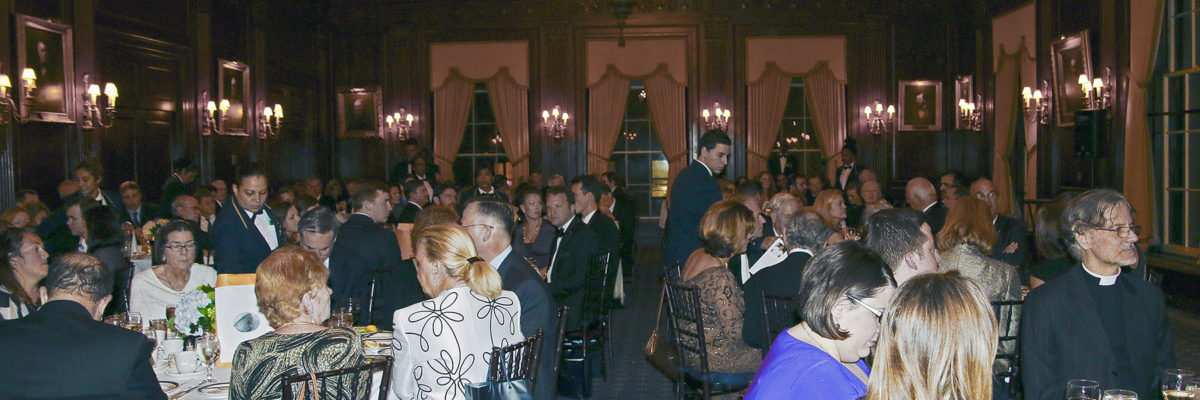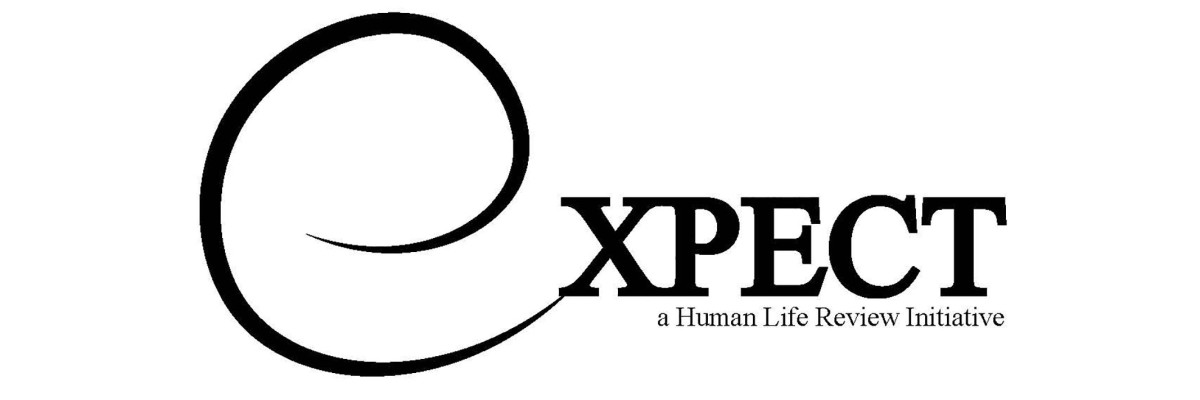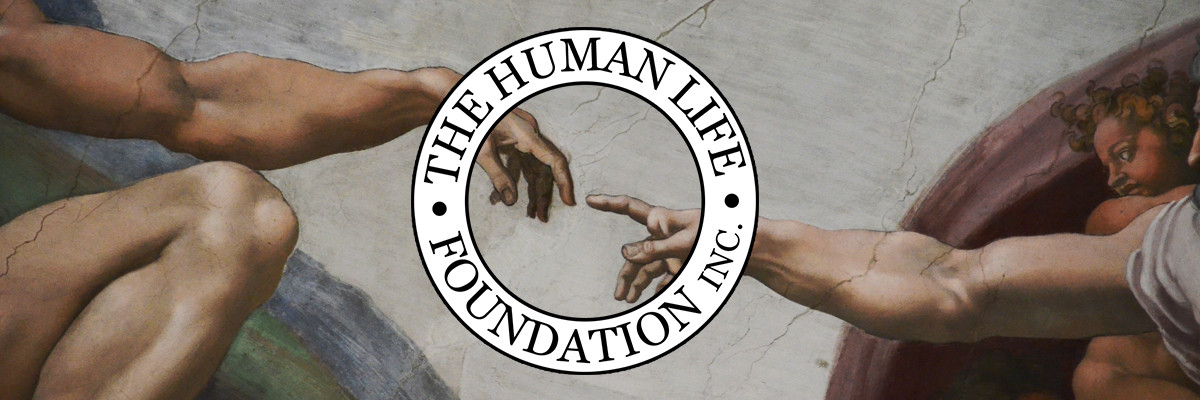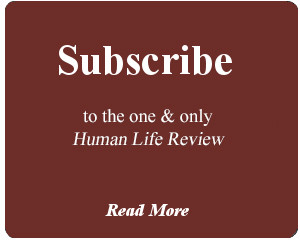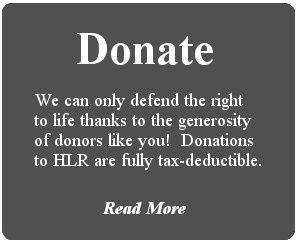October 27, 2016, Union League Club, New York
Distinguished guests, ladies and gentlemen and my brother Knights of Columbus, it is an honor to be with you this evening to accept the Great Defender of Life Award. Dorian and I first became active in the pro-life cause in the 1970s while we were in college. Since that time, I have had the privilege of working in the cause of life alongside saints such as Mother Teresa of Calcutta and Pope John Paul II and public servants such as Jim Buckley, Henry Hyde, Chris Smith and, of course, Jesse Helms and Ronald Reagan. But aside from religious leaders and elected officials I think the person who may have influenced me the most in the prolife movement was Jim McFadden.
And so, this evening is very special for me.
I first met Jim in 1976 after moving to Washington, D.C. and over many years I learned a great deal from him. He was a man of strategic vision, tactical know-how, political realism and, surprisingly for a person with these qualities, he was also a man of great humility. Jim was not interested in the limelight or accolades. He was interested in getting the job done.
He knew Capitol Hill needed a dependable prolife network and so he founded the Ad Hoc Committee in Defense of Life. He knew those of us working on the Hill needed timely news about what was happening in the movement as well as among policy makers and so he began Life Letter. He understood that to win as a political and social movement the prolife cause would have to reach out beyond the Catholic community into the Evangelical Protestant community and so he helped organize the Christian Action Council.
And he knew that in order to grow in a sustainable way the movement would have to attract and provide a forum to display the intellectual depth of the prolife cause and so he established The Human Life Review – a journal that soon had contributors such as Jerome Lejeune, Malcolm Muggeridge, Nat Hentoff and Walker Percy—to name just a few.
What I think was the key to the success of The Human Life Review and to Jim’s leadership in general was his steely realism, his uncompromising intellectual rigor and indomitable commitment to the cause of life.
It is in that spirit that I would offer some brief remarks this evening.
This election year, we are often told that poverty, inequality and peace are key themes.
According to one of the world’s foremost experts on poverty of all time, there is no greater poverty than that experienced in America. In her speech to Harvard’s graduates in 1982, Mother Teresa explained that the poorest of the poor weren’t in the slums of India. Calling abortion “one of the greatest poverties,” the humble saint added: “A nation, people, family that allows that, that accepts that, they are the poorest of the poor.”
Mother Teresa saw that the inequality of rights assigned to the unborn resulted in great poverty. She also regularly warned that this was likewise a threat to peace.
In 1994, at the National Prayer Breakfast, attended by congressional leaders of both parties and by President and Mrs. Clinton, Mother Teresa made a direct plea to the American people, saying: “I feel that the greatest destroyer of peace today is abortion, because it is a war against the child, a direct killing of the innocent child, murder by the mother herself. And if we accept that a mother can kill even her own child, how can we tell other people not to kill one another?”
The saint continued: “Any country that accepts abortion is not teaching its people to love, but to use any violence to get what they want.”
How much of the violence we see today, and how much of the coarsening of our culture is the result of a legal system and way of thinking that says some lives don’t matter—that some human beings have no rights at all.
We confront this greatest of poverties because our country has legally embraced, what theologians might call “a structural sin,” namely a legal system that denies the humanity of the unborn, and allows their innocent lives to be destroyed.
There are many threats to life in this country. All are to be resisted, but none comes close qualitatively or quantitatively to the devastation of abortion – the legal regime that has resulted in the intentional deaths of 50 million innocent human beings.
The Court’s decision in Roe v. Wade didn’t end the debate and it didn’t settle the law. Instead, it left a country deeply uncomfortable with the decision and it galvanized a movement in favor of the civil rights of those who could not speak for themselves.
That decision did something else too. It undermined the credibility of our Supreme Court in the way that Dredd Scott, Plessy v. Ferguson and Buck v. Bell had done before it. Two of those cases denied human rights to African Americans. The third, denied rights to those with intellectually disabilities, allowing their forced sterilization and opining that “three generations of imbeciles [was] enough.” In each of these cases, as in Roe, the Court usurped for itself the role that the Declaration of Independence leaves to God – that all are created equal, and endowed by our Creator with certain unalienable rights – including life, liberty and the pursuit of happiness. And it usurped that role with disastrous consequences.
If you doubt this, you have only to turn to the early volumes of The Human Life Review to see numerous legal scholars conclude not only that Roe v. Wade is bad constitutional law, but that it makes very little pretense of being constitutional law at all.
Roe, and its companion case of Doe v. Bolton, opened the door to virtually unrestricted abortion. And since that time the smallest and most common sense restrictions have been blocked by pro-abortion politicians or by federal courts.
But that hasn’t changed the fact that Americans remained unconvinced.
Forty-three years after Roe, our polling with Marist has found that a strong majority of Americans says abortion is morally wrong. They do so by 20 points. And 8 in 10 would restrict abortion to – at most – the first three months of pregnancy, and a majority would limit it to the rarest of cases, to cases of rape, incest, or to save the life of the mother, or would not allow it all.
We may see these positions as imperfect, given our strong belief in the value and dignity of every human life, but it is undeniable that if our politicians had the courage to act on this American consensus, we could eliminate almost all abortions in the United States.
Instead of embracing this consensus, we see too many politicians, including some who are Catholic, embracing ever more radical – and unpopular – positions.
Some pro-abortion candidates now want to repeal the Hyde Amendment even though almost two-thirds of Americans disagree.
Others use as a fig leaf their own “personal” opposition to abortion, but won’t allow what they say is a religious belief to influence their public policy.
Let us be clear. The unique life of the unborn child isn’t a matter of faith, it is a matter of science as the world famous geneticist Jerome Lejeune made clear in testimony before Congress and in the pages of The Human Life Review more than four decades ago. The intentional killing of an innocent human being is wrong not simply as a matter of religious belief. It is always wrong because intentionally killing the innocent is always a grave injustice.
When the late Governor of New York, Mario Cuomo, pioneered this “personally opposed” argument in 1984, he claimed that he couldn’t impose what he considered a minority view on the majority of Americans. It was a poor argument then.
It is an even poorer argument today, when 8 in 10 Americans support substantial limits on abortion. The position these politicians say they support in conscience could be acted on with overwhelming majority support, but instead they impose a political orthodoxy that is the minority view, violating their own conscience and the will of the majority.
The entire personally-opposed argument also throws away the principled position of John F. Kennedy before the Houston Ministerial Association in 1960. There, Senator Kennedy had said that a conscientious public official should resign his office if he concluded that enforcing a law would violate his conscience.
It seems this principled position has gone by the wayside. Today, all that is necessary is to “sincerely” register in a public forum one’s personal opposition to a morally offensive law and then one is morally free to defend and even promote the law one has concluded privately is gravely immoral. It is, of course, the very opposite of sound moral reasoning. It reflects the kind of counterfeit morality which one suspects Nelson Mandela and Martin Luther King spent much of their lives struggling against.
It is a doctrine that has for decades proved politically useful, but which may in the future be less tenable. Most Americans today agree that abortion is morally wrong. And huge majorities want restrictions on abortion. But still, these “personally opposed” politicians insist on violating both their own conscience and those of the majority of Americans.
I have not endorsed any candidate in any of this year’s elections. But I have argued that we should not vote for any candidate who supports abortion and opposes abortion restrictions.
When confronting the greatest poverty in the world, the number one cause of death in our country, the greatest destroyer of peace, the cornerstone of violence, and the denial of human rights to an entire class of people, and which has resulted in death on such a massive scale, I do not see how it is even remotely possible to build a culture of life and a just society by electing people who defend such a regime.
The reason is twofold.
First is the simple math that tells us that no other issue takes as many lives – all of them innocent – as abortion. Heart disease comes in a distant second.
Second, compromising on this issue for the sake of other issues has not moved pro-abortion politicians in the direction of life. To the contrary, it has moved them further away—as the recent campaign to overturn the Hyde Amendment demonstrates. Those Catholics and other people of faith who think they have more influence as “insiders” with pro-abortion politicians have failed to deliver.
If Catholics were to stand together with other people who support life to make abortion the preeminent human rights issue of our time and to treat it as a truly non-negotiable priority, imagine how different our country would be.
In 1976, this almost happened. We could have had pro-life Democrat Sargent Shriver, who ran against Jimmy Carter in the primary, as president. If Shriver had won the primary and beaten Gerald Ford, it seems very unlikely that four years later Ronald Reagan could have put together a coalition of blue collar Catholics and values voters to defeat a Pro-Life Catholic President Shriver as he did defeat President Carter in 1980.
If this had happened, we might have had two parties committed to restricting abortion. We might have been able to have an ongoing debate over the rest of the important issues in Catholic social teaching. We might have been able to have a rational discussion of how to best tackle issues like immigration, the environment, poverty, the economy, and foreign policy.
I believe we can create such a moment again. If we stand together and say no politician, of any political party, will get my vote unless he or she commits to policies that legally restrict abortion.
Quite simply, if enough of us did that, both parties would have to listen. And that would be real change.
But this isn’t just an election year. For Catholics, it is also the Year of Mercy. And for all of us who value the life of each person – including the life of every unborn child – we think of abortion not just as a political issue, but as a personal one.
Mother Teresa told us we should fight abortion with adoption, and everyone who would reduce abortion should commit to helping women in crisis pregnancies and by supporting adoption. In my book, A Civilization of Love: What Every Catholic Can Do to Transform the World, I mentioned that years ago Dorian and I brought into our home a young unmarried pregnant girl who lived with us throughout her pregnancy and who we helped place her child with a loving Catholic couple through a private adoption. What I did not mention in the book was that the individual who assisted in that private adoption by finding the adopting couple was Jim McFadden.
We can be proud that for decades the pro-life movement has assisted women in choosing life by – among other things – making sure they have access to a full range of pre-natal health care options including the chance to see the child in their womb via ultrasound. In this regard I am tremendously proud of the Knights of Columbus initiative of placing the most technically advanced ultrasound machines in crisis pregnancy centers.
Since this program began in 2009 we have placed 720 machines with a value of more than $35 million. Of course, we do not know the number of lives that these machines have saved. But if each machine is decisive in convincing just one mother each week to keep her baby, these machines will save more than 37,000 lives each year. And they will keep doing this year in and year out.
Emotionally and spiritually, we must also accompany women. Whether they are pregnant, have had their child, or have had an abortion we need to continue our support of ministries like Project Rachel. We have a responsibility to accompany women who face these challenges in ways that encourage them to see that the choice for life is at the same time a choice for their own fulfillment.
There is so much for us to do to bring about a culture of life in our politics, our economics and how we respect the inherent dignity of each human being. There must be a comprehensive, holistic approach that looks forward to the day in which each person is truly welcomed and accepted.
In beginning these remarks, I mentioned that Dorian and I have been working continuously in the pro-life cause since we were in college together. Since that time I have had the opportunity to be involved in numerous pro-life initiatives including the Helms Amendment, the Hyde Amendment, the Human Life Bill, the Mexico City Policy, various Human Life Amendments to the Constitution, litigation such as Harris v. McRae, the Bork, and Scalia nominations to the Supreme Court and initiatives such as our own ultrasound machine program. In all these efforts, the person whose advice I have relied upon the most has been Dorian. And there have been several times in the past decades were I have asked her whether we have done our part and whether it is time to move on to other matters. Her answer has always been: there is so much still to do, we can still make a contribution, we must stay the course. So tonight, I would like to give my own, personal Great Defender of Life Award to my wife, Dorian.
Earlier, I mentioned the influence of a former governor of New York. In closing, I would like to quote another governor of New York whose words have always provided guidance for me and which I think are particularly appropriate for those of us committed to the cause of life. Teddy Roosevelt once said this:
“In any moment of decision, the best thing you can do is the right thing.
The worst thing you can do is nothing….
Do what you can, with what you have, where you are.”
So let us continue together in what Ronald Reagan once described as “the long march for life” confident that we are in the right and that in America, despite all obstacles, right will ultimately prevail. Again, thank you very much.




